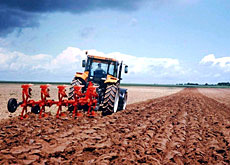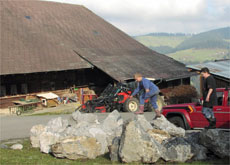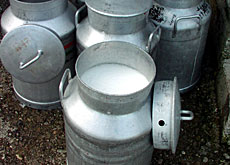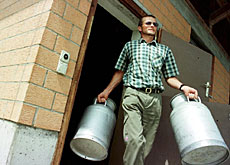Farmers unite against liberalisation plans

Farmers have spoken out against proposals to liberalise the Swiss agricultural market.
They say plans by the World Trade Organization (WTO) to cut tariffs and subsidies in developed countries could sound the death knell for the sector in Switzerland.
The 146 members of the Geneva-based WTO are currently trying to hammer out a deal to reduce global trade barriers to help developing countries compete with richer nations.
But the Swiss government says it is alarmed by the WTO’s goals, which include slashing import duties and subsidies by up to 60 per cent within the next five years, and scrapping export grants within ten years to boost imports from poorer nations.
Bern said such measures would impose an “intolerable burden” on Swiss farmers.
The World Bank and the International Monetary Fund (IMF) have also taken aim at protectionist tariffs in agriculture.
Nick Stern, the World Bank’s chief economist, said the world’s poorest countries were effectively barred from exporting their agricultural produce to Europe and the United States because of protectionist import duties and subsidies.
The trade barriers imposed by richer countries – Switzerland included – were crippling the economic growth of developing nations, he said.
Outcry
However, the Swiss Farmers Union is fighting to maintain government subsidies for agriculture, arguing that they are vital not only to the industry, but also for the survival of rural regions and for the conservation of the countryside.
European Union countries, Japan and Norway are among the 75 nations that are also strongly in favour of maintaining the status quo.
Swiss farmers say the WTO’s liberalisation measures would be tantamount to scrapping protectionist import measures altogether, sending global agricultural prices plummeting.
“The national agrarian reform packet proposed by the Swiss government is almost nothing compared with the dramatic impact the WTO’s measures would have,” says Karl Tschuppert, a Swiss parliamentarian and farmer.
Slower pace
Switzerland has indicated that it is in favour of liberalisation across all sectors, including agriculture – but on a more limited scale and at a slower pace.
Luzius Wasescha, responsible for trade contracts at the State Secretariat for Economic Affairs (Seco), says he is optimistic that a compromise can be reached between protectionist countries and the WTO.
“In the past, there’s always been a way of bringing two strongly opposing camps closer to one another,” he told swissinfo. “It’ll be the same this time around.”
Wasescha hopes that a compromise can be reached during two rounds of negotiations in June and July ahead of the WTO’s main meeting of trade ministers in Mexico in October.
“If we are reasonable in our arguments, I think we’ll have some room for manoeuvre in the negotiations,” says Wasescha. “But if we adopt the same position as the larger agricultural exporters, we’ll reach a consensus.”
Wasescha argues that the best move for Switzerland would be to support – along with the 75 other nations – reducing import duties by 36 per cent and to gradually reduce direct subsidies.
“This would give us more flexibility in our export grants,” he says.
swissinfo, Elvira Wiegers (translation: Vanessa Mock)
The WTO wants to reduce global trade barriers to help developing countries compete with richer ones.
Key goals include slashing import duties by up to 60 per cent within five years, and scrapping export grants within ten years.
Swiss farmers, who are fighting to maintain government agriculture subsidies, fear the effects of the WTO’s plans.
Switzerland’s economy is very dependent on exports, which account for 40 per cent of GDP.
Swiss farmers earned on average SFr30,400 ($22,200) in 2002.

In compliance with the JTI standards
More: SWI swissinfo.ch certified by the Journalism Trust Initiative



You can find an overview of ongoing debates with our journalists here. Please join us!
If you want to start a conversation about a topic raised in this article or want to report factual errors, email us at english@swissinfo.ch.